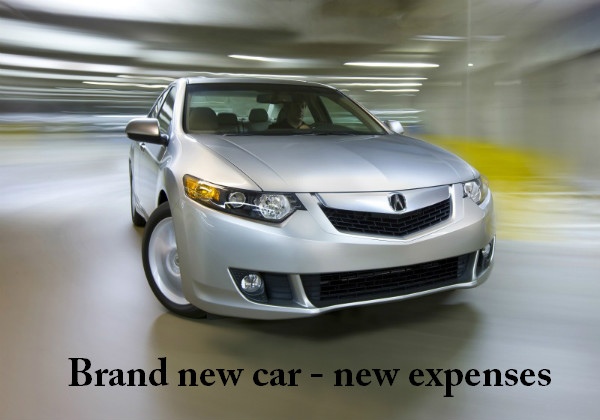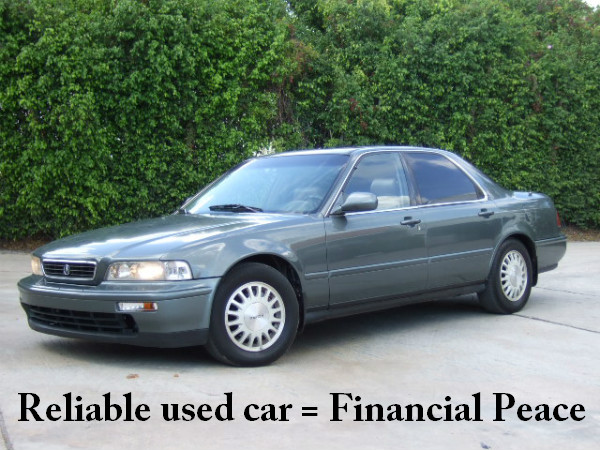Our car is a gazillion years old
My car has been with me for quite some time. I remember picking up my wife for our first date in it - about nine years ago. I remember heading to my friend’s graduation and packing 5 people into this little thing. Heck, I even remember my dad teaching me how to check tire pressure on it. Every little life event we’ve experienced, our little Donkey (that’s how we affectionately call it) been there for us. We moved, got married, changed jobs, had bad things happen to us, had good things happen to us - and our Donkey has always been there to drive us around.
Our Donkey is a mid-nineties child with its own character traits and just over 230,000 kms on its odometer. For the most part, it has never given us any troubles - just ongoing maintenance, replacing parts when we need them, and a good cleaning now and then. Inside and outside it looks absolutely fantastic - for a car of this age. Once in a while, I wax it on a sunny day, and it starts sparkling and almost causing traffic accidents by blinding oncoming traffic.
What would a brand new car mean to our finances?
Once in a while my mom asks me how come I’m still driving this old thing. Our friends politely giggle at how out of place our car looks next to theirs when we get together, and wonder what stops us from upgrading.
Let’s say one day we forget everything we’ve learned about personal finance, and buy ourselves a brand new car. We walk into our local Acura dealership, sign the papers, and drive away a new Acura TL - complete with leather seating, LED lighting, navigation system, and power windows (something I’ve never had in my life, can you imagine?). What would a brand new car do to our finances?

New Car
Here’s a list of new expenses we would have to fit into our budget:
- Financing (or worse yet - leasing) is on average $450/month in Canada. Every month an average family sends this much to the bank for the privilege of driving a new car. While our budget could absorb it, it would certainly mean less money being invested as per my New Year’s Resolutions.
- Insurance costs would go up - and once again would take a bite out of our budget. Our Donkey costs us less than $100/month to insure - mainly because it’s a fairly cheap car to replace. If it was a brand new vehicle, this number would undoubtedly go up into the stratosphere.
- Brand new car depreciates in value like a stone. If you buy a $40,000 car today, its value will hover around $20,000 three years later - which is an equivalent of burning a $100 bill every week while you drive your car to work. I’m sorry, but I have a better use for $100 bills which doesn’t involve burning.
- Increased running costs would punch our monthly budget further into unconsciousness. Most luxury vehicles these days require premium gasoline which costs more. Little engine on our Donkey burns very little gasoline, and doesn’t care about higher quality fuels.
- Maintenance costs would also go up because newer cars are more expensive to fix - considering how complex they are and how much training mechanics need to have. My friend’s BMW needed a new window mechanism, and between labor and new parts, he had to shell out almost $800! I haven’t paid this much for anything done on this car for as long as I owned it - even new radiator.
- Heck, even car washes would be more expensive - because newer car would command premium car wash complete with waxing and deluxe detailing. No need to do this with our old car, I can wash and vacuum it myself once in a while. No need to spend extra money and it gives me something to do with my hands on Saturday.
Moral of the story?

Used Car
So, for now we’ll stick to our used car. It might be almost 20 years old, but it’s very reliable and makes sense for us financially at the present times. Sure, it’s not a head-turner. But we’ve gotten used to it and it gets us from point A to point B with a certain classic feel to it. One day it will be time for it to go (some sort of farm where all aged cars go, perhaps?) - and we’re already saving money for our next used car. But for now, I’m perfectly happy with it.
And trust me, I’m not against buying nice cars - or nice things in general. I’m not the kind of person who believes in driving old cars till the day I die and eating nothing but oatmeal just to save money. But I do believe that buying new cars only makes sense when your financial future is secure with enough investments set aside, your income can absorb all increased costs and buying a new car won’t put a dent in your budget. Unfortunately, we’re not quite there financially, and we’re making a conscious decision to drive with less flare, but more financial stability down the road.
How old is your car?
